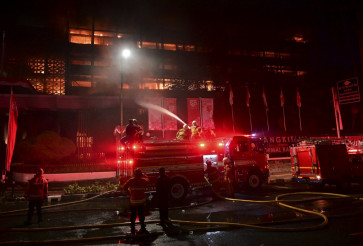Andri Rizki Putra: A young hero for dropouts
Andri Rizki PutraEddi Subagyo looked dizzy while trying to understand the logarithm his teacher was explaining in class at the Bintaro Trade Center (BTC) in Tangerang
Change text size
Gift Premium Articles
to Anyone

Andri Rizki Putra
Eddi Subagyo looked dizzy while trying to understand the logarithm his teacher was explaining in class at the Bintaro Trade Center (BTC) in Tangerang.
For three hours on Tuesday and Thursday evenings, the 48-year-old toy seller stops work to pursue a Kejar Paket C, or senior high-school equivalency diploma, at the Foundation for Leaders of the Nation's Children (YPAB), founded by a high-school dropout turned lawyer, Andri Rizki Putra.
Rizki said that like Eddi was typical of YPAB's student body, which also includes street children, drivers, fried snack sellers, maids, street singers and three-in-one jockeys.
'We founded YPAB to accommodate everyone who still has a strong passion to study amid economic difficulties,' said the 24-year-old. 'Here, they can enjoy a free education.'
The idea for founding the YPAB came from Rizki's own experiences in getting an equivalency diploma.
Rizki said that while taking the National Examinations (UN) in 2006, he saw teachers letting his friends cheat at the most prestigious junior high school in South Jakarta.
He also said teachers sent students answers via text message during the exam, he said.

However, his teachers turned blind eyes to his complaints, Rizki said. 'My friend told me that cheating was already mainstream during the UN. If I refused to go along, I would be left behind.'
Such experiences made him realize that something was wrong with the country's national education system because it failed to create a generation with honesty and integrity.
Rizky said that things were no different at senior high school, so he dropped out and continued studying at a community learning center that offered the Kejar Paket program, which since the early 1970s has helped dropouts earn equivalency diplomas.
By studying more than 20 hours a day, he finished his Kejar Paket C in less than a year. Rizky then became a law student at the University of Indonesia in 2007, graduating cum laude and landing a job at the law firm Baker and McKenzie.
Rizky realized that he was not the only dropout, so he established the YPAB in 2012 in Bintaro and Tanah Abang, Central Jakarta. A year later, he opened a branch in Medan, North Sumatra.
YPAB manager Lia Khairunnisa, 24, said that the foundation offered grounding in the subjects covered by the National Exams: mathematics, English, biology, Indonesian and physics.
She said that because of an emphasis on ethics, the YPAB would not let students take the UN if they did not exercise good behavior.
She said that the foundation also trained its students with practical courses, such as on financial literacy, banking, entrepreneurship and communications. 'We also give them lessons on writing powerful curriculum vitae.'
The YPAB, she said, invited news presenters Grace Natalie, Isyana Bagoes Oka and Andrie Nugroho Djarot to train students in public speaking through a tutor development program on Feb. 22.
As of today, the YPAB had 154 students and 85 volunteer teachers, up from three and four when it was first founded, said Lia.

However, the YPAB still finds difficulty attracting more dropouts to continue their studies, Rizki said.
He recalled that out of the five students in the first cohort, only one took the UN.
Another challenge, he said, was how to change the mind-sets of students who were more focused on getting certificates rather than gaining knowledge.
He said that he also faced negative stereotypes from his neighbors, especially during the early period of the YPAB. In Bintaro, for example, he was accused of running prostitutes by some members of the Family Welfare Movement (PKK) because classes were conducted in small rooms and garages.
Meanwhile, he was frequently forced to pay illegal levies to thugs in Tanah Abang, Rizky said.
However, Rizky says such challenges could never stop him from struggling. Since the first cohort, some graduates have gotten better jobs in some companies, while others received scholarships to continue their studies at colleges such as Budi Luhur University and Bina Sarana Informatika in Jakarta.
'Through the YPAB, we want to motivate all dropouts not to give up reaching for their dreams. We want to help them get better lives,' said Rizki.
' Photos by A. Kurniawan Ulung









